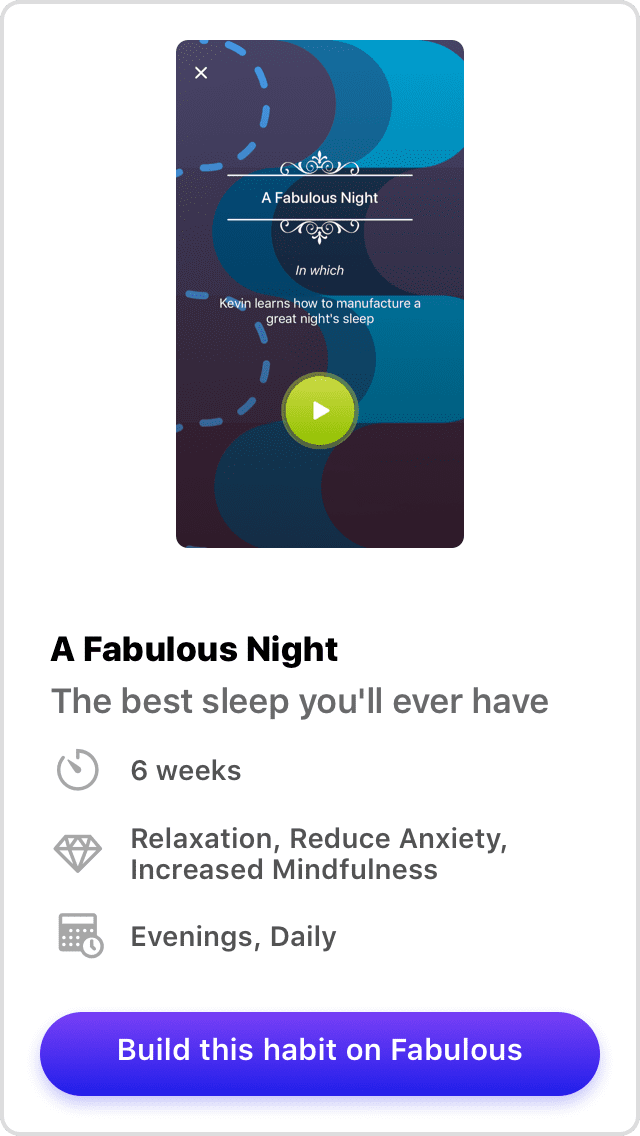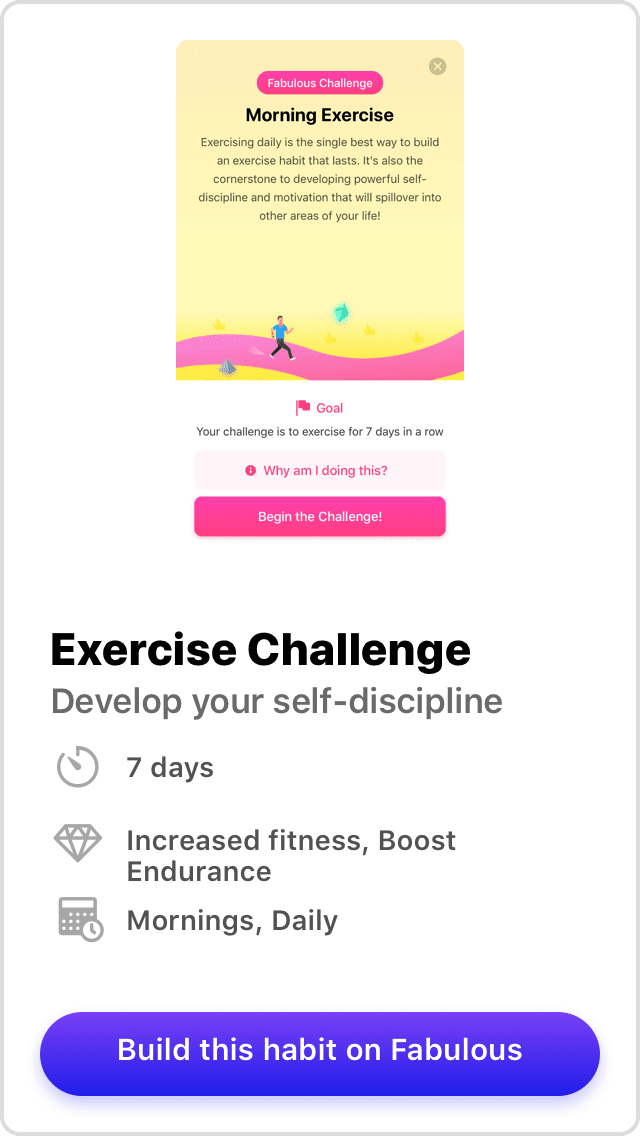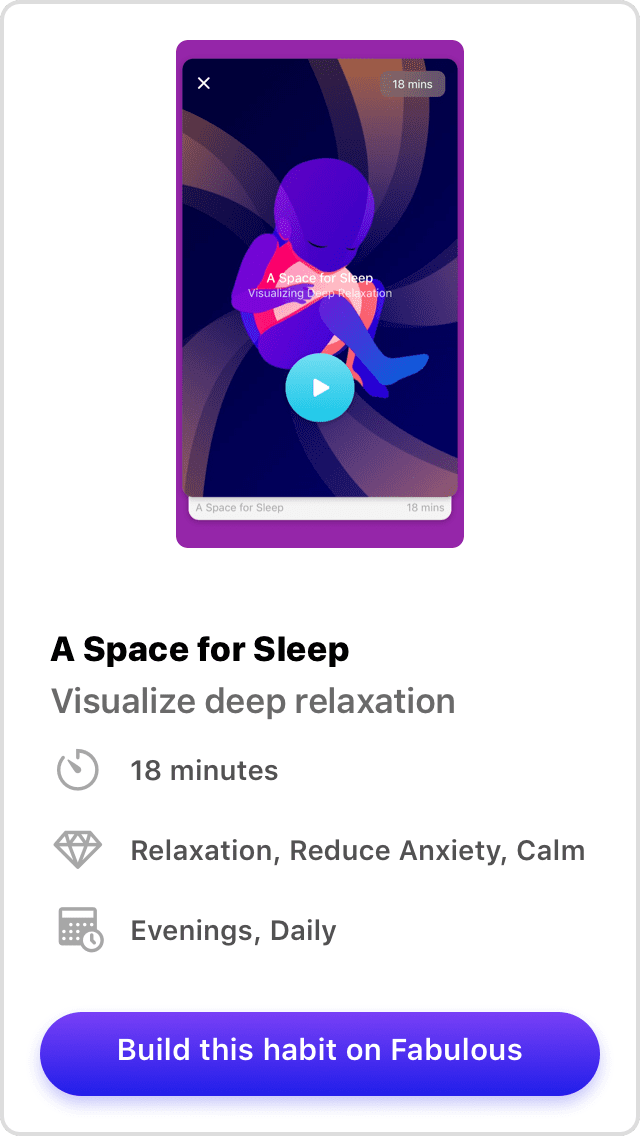Sleep. It’s something we all have to do, but as life becomes more fast-paced and interconnected than ever before, sleep has been shoved to the backburner. When you have variable work schedules, meetings with colleagues on the other side of the globe, or have to stay up late during exams or project crunch times, a good night’s rest can feel downright impossible. What are we to do?
In Why We Sleep, Matthew Walker attempts to unravel the many mysteries of this biological necessity. He discusses why sleep is so important, how we can improve the quality of our sleep, and the tremendous consequences of not getting enough of it.
Need help mastering your nighttime routine? Download Fabulous today and start the A Fabulous Night journey!
Why We Sleep
The scientific study of sleep is in its infancy and there’s still a lot to learn. We know every animal sleeps in some way or another, though we’re not sure why some animals need more or less shuteye than others. We also know that there are several sleep stages your body cycles through each night. They can be sorted into two major categories: Rapid Eye Movement (REM), and Non-Rapid Eye Movement (NREM). Finally, we know that, whether we like it or not, getting our nightly forty winks is essential to good overall health. But what does sleeping actually do for us?
Sleep and Your Body
If I asked you what causes heart disease, you’d probably guess things like a poor diet or high levels of stress, and you’d be right. But there is another, equally nefarious cause of cardiovascular problems: sleep deprivation.
When you sleep, your whole body relaxes. This gives your heart and blood vessels a break from having to work so hard. When you don’t get enough sleep, however, they have to work overtime, which causes excess strain. In the long-term, sleep deprivation can permanently damage your blood vessels.
Sleep is also your body’s chance to repair muscle tissue from everyday wear and tear. When you don’t get enough, your muscles don’t get to heal, which can lead to soreness, especially if you worked your body extra hard the day before!
Did you know regularly exercising can actually help you sleep better? Sign up for Fabulous’s Morning Exercise challenge!
Sleep and Your Mind
If you’ve ever stayed up too late or pulled an all-nighter, you know that not getting enough sleep can make you feel like a total zombie. It’s harder to concentrate, harder to make decisions, and harder to get through your day’s tasks.
And that’s only the beginning. When you’re sleep deprived, your brain enters states of “microsleep” during the day to help make up the difference. These microsleeps can last several seconds, which can have fatal consequences if you’re, for example, driving your car. And it only takes one night without sleep to impair your judgment, concentration, and memory as much as drinking alcohol would.
Poor sleep can also affect your mood or aggravate mental illness symptoms. This, combined with your impaired concentration and willpower, makes it harder to do the things that would help you sleep better, like exercising or eating well. In other words, poor sleep leads to poor self-care, which in turn leads to poorer sleep, creating a vicious and unhealthy self-perpetuating cycle.
Anxious thoughts keeping you up at night? Try the Fabulous A Space for Sleep Meditation and to relax and get some much-needed Z’s.
How to Sleep More (And Better)
It’s clear that good sleep hygiene is the foundation upon which all other aspects of good health rest. Like it or not, you need sleep, and scientists are unlikely to discover a way around it for years to come.
So, what can you do to help you sleep better?
Prepare Your Environment
Your body’s sleep and waking cycle is dictated by your circadian rhythm, which serves as your body’s internal clock. Your circadian rhythm relies on cues from your environment to determine whether it’s time to be awake or asleep. Luckily, you can create these cues yourself.
Make it dark. Light is the biggest cue your body relies on when it comes to getting ready for bed. Dimming the lights a few hours before bed and sleeping in a pitch-black room can help you fall asleep faster and stay asleep longer. You can also use light to wake up more easily. Keep your curtains open to let the sun in, or use a light-based alarm clock to gently rouse yourself in the morning.
Cool things down. Your body temperature goes down slightly while you’re sleeping, so being in a cooler environment can signal your body that it’s time to get sleepy. Keeping your room relatively chilly–around 60-65 degrees Fahrenheit–can prevent you from getting too warm in the middle of the night and waking up.
Prepare Your Body
Your brain also relies on signals from your body to tell it that it’s time to rest. And, just like you can shape your environment, you can also nudge your body’s internal clock toward bedtime with some additional cues.
Warm up in a bath.
Cooler temperatures make you sleepy. When you take a hot bath, your blood rushes to the surface of your skin to help cool you off. When you get out, your body temperature cools significantly, which can make you feel drowsy. Light, gentle exercises like yoga can also achieve this effect. More intense exercise, however, might actually keep you awake.
Avoid caffeine, alcohol, and nicotine.
Avoiding caffeine might seem like a given since it’s designed to keep you awake, but nicotine is also a stimulant that stays in your body long after you consume it. Alcohol, while technically a depressant, might make you feel drowsy, but it actually makes it harder to fall into deep sleep stages, which means you’re likely to wake up more easily while also robbing you of the restorative benefits of deep sleep.
Finally, the most important thing you can do for your bedtime routine is to keep it consistent. Your body clock depends on routine to function. When you go to bed at the same time each night, you’ll start to feel drowsy around that time even without cues, because your body knows to start getting ready for bed around that time. With time and dedication, you can build a nighttime routine that will keep you at the top of your game.
And, if you need some accountability, you can always download Fabulous to help you stay on track. 🙂
Sweet dreams!






